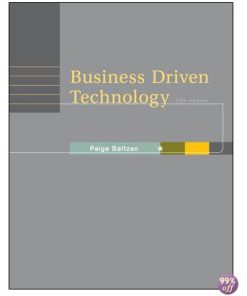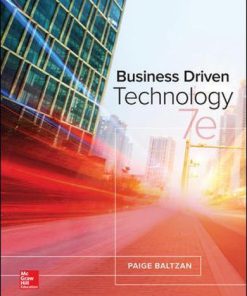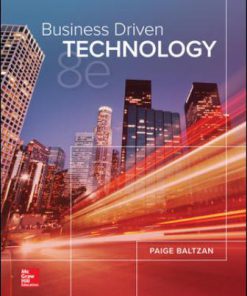Test Bank for Business Driven Technology 8th by Baltzan
$35.00 Original price was: $35.00.$26.50Current price is: $26.50.
Test Bank for Business Driven Technology 8th by Baltzan
This is completed downloadable of Test Bank for Business Driven Technology 8th by Baltzan

Product Details:
- ISBN-10 : 1260548104
- ISBN-13 : 978-1260548105
- Author: Paige Baltzan (Author)
International Student Edition of Business Driven Technology 8th edition by Paige Baltzan and Amy Phillips This ISBN 9781260548105 is Textbook only. It will not come with online access code. Online Access code (if required by your instructor ) sold separately at ISBN 9781260425215 The content of of this title on all formats are the same. Business Driven Technology 8e provides the ultimate flexibility in tailoring content to the exact needs of your MIS or IT course! Business Driven Technology 8e offers flexibility to customize according to your needs, as well as course and student needs, by covering essential concepts and topics in five core units, while providing additional in-depth coverage via the business and technology plug-ins.
Table of Content:
- UNIT 1 Achieving Business Success
- Big Data, Big Analytics
- Introduction
- CHAPTER 1: BUSINESS DRIVEN TECHNOLOGY
- Competing in the Information Age
- Data
- Information
- Business Intelligence
- Knowledge
- Systems Thinking and Management Information Systems
- The MIS Solution
- Systems Thinking
- Chapter 1 Case: The World Is Flat—Thomas Friedman
- CHAPTER 2: Identifying Competitive Advantages
- Identifying Competitive Advantages
- Swot Analysis: Understanding Business Strategies
- The Five Forces Model—Evaluating Industry Attractiveness
- Buyer Power
- Supplier Power
- Threat of Substitute Products or Services
- Threat of New Entrants
- Rivalry Among Existing Competitors
- Analyzing the Airline Industry
- The Three Generic Strategies—Choosing a Business Focus
- Value Chain Analysis—Executing Business Strategies
- Chapter 2 Case: Michael Porter on TED—The Case for Letting Business Solve Social Problems
- CHAPTER 3: Strategic Initiatives for Implementing Competitive Advantages
- Business Process Reengineering
- Types of Business Processes
- Using Mis to Improve Business Processes
- Supply Chain Management
- Customer Relationship Management
- Enterprise Resource Planning
- Chapter 3 Case: Amazon Drone Knocking
- CHAPTER 4: Measuring the Success of Strategic Initiatives
- MIS Roles and Responsibilities
- Metrics: Measuring Success
- Efficiency and Effectiveness Metrics
- The Interrelationship Between Efficiency and Effectiveness MIS Metrics
- Metrics for Strategic Initiatives
- Chapter 4 Case: Manipulating the Data to Find Your Version of the Truth
- CHAPTER 5: Organizational Structures That Support Strategic Initiatives
- Information Ethics
- Information Does Not Have Ethics: People Do
- Information Security
- Hackers: A Dangerous Threat to Business
- Viruses: A Dangerous Threat to Business
- Chapter 5 Case: Fifteen Million Identity Theft Victims
- Learning Outcome Review
- Review Questions
- Making Business Decisions 81
- Unit Summary
- Key Terms
- Unit Closing Case One: The Internet of Things
- Unit Closing Case Two: Five Ways Hackers Can Get into Your Business
- Apply Your Knowledge
- AYK Application Projects
- UNIT 2 Exploring Business Intelligence
- Bitcoin
- Introduction
- CHAPTER 6: Valuing and Storing Organizational Information—Databases
- The Business Benefits of High-Quality Information
- Information Type: Transactional and Analytical
- Information Timeliness
- Information Quality
- Information Governance
- Storing Information Using a Relational Database Management System
- Storing Data Elements in Entities and Attributes
- Creating Relationships Through Keys
- Coca-Cola Relational Database Example
- Using a Relational Database for Business Advantages
- Increased Flexibility
- Increased Scalability and Performance
- Reduced Information Redundancy
- Increased Information Integrity (Quality)
- Increased Information Security
- Driving Websites with Data
- Website Data
- Integrating Information among Multiple Databases
- Data Integration
- Chapter 6 Case: Political Microtargeting: What Data Crunchers Did for Obama
- CHAPTER 7: Accessing Organizational Information—Data Warehouses
- Data Warehousing: Supporting Decisions with Business Intelligence
- History of the Data Warehouse
- Data Mart
- Information Cleansing (Or Scrubbing)
- Business Intelligence
- The Problem: Data Rich, Information Poor
- The Solution: Business Intelligence
- Chapter 7 Case: Using Data to Drive Business Operations
- CHAPTER 8: Understanding Big Data and Its Impact on Business
- The Power of Big Data Analytics
- Distributed Computing
- Virtualization
- Analyzing Big Data
- Data Mining
- Data-Mining Process Model
- Data-Mining Analysis Techniques
- Data Mining Modeling Techniques for Predictions
- Data Analysis
- Advanced Data Analytics
- Data Visualization
- Chapter 8 Case: Two Trillion Rows of Data Analyzed Daily—No Problem
- Learning Outcome Review
- Review Questions
- Making Business Decisions
- Unit Summary
- Key Terms
- Unit Closing Case One: Data Visualization: Stories for the Information Age
- Unit Closing Case Two: Informing Information
- Apply Your Knowledge
- AYK Application Projects
- UNIT 3 Streamlining Business Operations
- Robots Took My Job
- Introduction
- CHAPTER 9: Enabling the Organization—Decision Making
- Making Organizational Business Decisions
- The Decision-Making Essentials
- Using MIS to Make Business Decisions
- Operational Support Systems
- Managerial Support Systems
- Strategic Support Systems
- The Future: Artificial Intelligence
- Expert Systems
- Neural Networks
- Genetic Algorithms
- Intelligent Agents
- Virtual Reality
- Chapter 9 Case: My Virtual Reality Check Bounced
- CHAPTER 10: Extending the Organization—Supply Chain Management
- Information Technology’s Role in the Supply Chain
- Visibility Into the Supply Chain
- Technologies Reinventing the Supply Chain
- 3D Printing Supports Procurement
- RFID Supports Logistics
- Drones Support Logistics
- Robotics Supports Materials Management
- The Extended Supply Chain
- Chapter 10 Case: BOGO: Buy One, Get One
- CHAPTER 11: Building a Customer-centric Organization—Customer Relationship Management
- Customer Relationship Management
- The Power of the Customer
- Operational and Analytical CRM
- Marketing and Operational CRM
- Sales and Operational CRM
- Customer Service and Operational CRM
- Analytical CRM
- Extending Customer Relationship Management
- Supplier Relationship Management
- Partner Relationship Management
- Employee Relationship Management
- Chapter 11 Case: Robots are in the House!
- CHAPTER 12: Integrating the Organization from End to End—Enterprise Resource Planning
- Enterprise Resource Planning (ERP)
- Bringing the Organization Together
- The Evolution of ERP
- Integration Tools
- Core and Extended ERP Components
- Core ERP Components
- Extended ERP Components
- Measuring ERP Success
- The Future of ERP
- On-Premise ERP
- Cloud ERP
- Hybrid ERP
- Chapter 12 Case: Five Famous ERP Failures
- Learning Outcome Review
- Review Questions
- Making Business Decisions
- Unit Summary
- Key Terms
- Unit Closing Case One: The Connected Car Revolution
- Unit Closing Case Two: Dream It, Design It, 3D Print It
- Apply Your Knowledge
- AYK Application Projects
- UNIT 4 Building Innovation
- Slack-Be Less Busy
- Introduction
- CHAPTER 13: Creating Innovative Organizations
- Disruptive Technologies and Web 1.0
- Disruptive versus Sustaining Technology
- The Internet and World Wide Web—The Ultimate Business Disruptors
- Web 1.0: The Catalyst for Ebusiness
- Advantages of Ebusiness
- Expanding Global Reach
- Opening New Markets
- Reducing Costs
- Improving Effectiveness
- Chapter 13 Case: IBM Watson Taking over the World
- CHAPTER 14: Ebusiness
- Ebusiness Models
- Business-To-Business (B2B)
- Business-To-Consumer (B2C)
- Consumer-To-Business (C2B)
- Consumer-To-Consumer (C2C)
- Ebusiness Forms and Revenue-Generating Strategies
- Ebusiness Fraud
- Ebusiness Tools for Connecting and Communicating
- Instant Messaging
- Podcasting
- Videoconferencing
- Web Conferencing
- Content Management Systems
- The Challenges of Ebusiness
- Identifying Limited Market Segments
- Managing Consumer Trust
- Ensuring Consumer Protection
- Adhering to Taxation Rules
- Chapter 14 Case: Are You Ready for Your Next Gig?
- CHAPTER 15: Creating Collaborative Partnerships
- Web 2.0: Advantages of Business 2.0
- Content Sharing Through Open Sourcing
- User-Contributed Content
- Collaboration Inside the Organization
- Collaboration Outside the Organization
- Networking Communities with Business 2.0
- Social Tagging
- Business 2.0 Tools for Collaborating
- Blogs
- Wikis
- Mashups
- The Challenges of Business 2.0
- Technology Dependence
- Information Vandalism
- Violations of Copyright and Plagiarism
- Web 3.0: Defining the Next Generation of Online Business Opportunities
- Egovernment: The Government Moves Online
- Mbusiness: Supporting Anywhere Business
- Chapter 15 Case: Stars Website Analytics
- CHAPTER 16: Integrating Wireless Technology in Business
- Wireless Network Categories
- Personal Area Networks
- Wireless LANs
- Wireless MANs
- Wireless WAN—Cellular Communication System
- Wireless WAN—Satellite Communication System
- Protecting Wireless Connections
- Managing Mobile Devices
- Business Applications of Wireless Networks
- Radio-Frequency Identification (RFID)
- Global Positioning System (GPS)
- Geographic Information Systems (GIS)
- Chapter 16 Case: The Magic Mobility of Disney
- Learning Outcome Review
- Review Questions
- Making Business Decisions
- Unit Summary
- Key Terms
- Unit Closing Case One: BitCoin
- Unit Closing Case Two: Disrupting the Taxi: Uber
- Apply Your Knowledge
- AYK Application Projects
- UNIT 5 Transforming Organizations
- Gamer Delight
- Introduction
- CHAPTER 17: Developing Software to Streamline Operations
- The Systems Development Life Cycle (SDLC)
- Phase 1: Planning
- Phase 2: Analysis
- Phase 3: Design
- Phase 4: Development
- Phase 5: Testing
- Phase 6: Implementation
- Phase 7: Maintenance
- Chapter 17 Case: Bugs Everywhere
- CHAPTER 18: Methodologies for Supporting Agile Organizations
- Software Development Methodologies
- Rapid Application Development (RAD) Methodology
- Extreme Programming Methodology
- Rational Unified Process (RUP) Methodology
- Scrum Methodology
- Developing a Service-Oriented Architecture
- Interoperability
- Loose Coupling
- Soa Service
- Chapter 18 Case: Scratch
- CHAPTER 19: Managing Organizational Projects
- Using Project Management to Deliver Successful Projects
- Unclear or Missing Business Requirements
- Skipped Phases
- Changing Technology
- The Cost of Finding Errors in the SDLC
- Balance of the Triple Constraints
- Primary Project Planning Diagrams
- Outsourcing Projects
- Outsourcing Benefits
- Outsourcing Challenges
- Chapter 19 Case: Disaster at Denver International Airport
- Learning Outcome Review
- Review Questions
- Making Business Decisions
- Unit Summary
- Key Terms
- Unit Closing Case One: Reducing Ambiguity In Business Requirements
- Unit Closing Case Two: Getting Your Project on Track
- Apply Your Knowledge
- AYK Application Projects
- Business Plug-Ins
- B1: Business Basics
- Introduction
- Types of Business
- Sole Proprietorship
- Partnership
- Corporation
- Internal Operations of a Corporation
- Accounting
- Financial Statements
- Finance
- Financial Analysis
- Human Resources
- Management Techniques
- Sales
- The Sales Process
- Market Share
- Marketing
- Marketing Mix
- Customer Segmentation
- The Product Life Cycle
- Operations/Production
- Transforming Corporations
- Management Information Systems
- Plug-In Summary
- Key Terms
- Making Business Decisions
- B2: Business Process
- Business Process Modeling
- Using MIS to Improve Business Processes
- Operational Business Processes—Automation
- Managerial Business Processes—Streamlining
- Strategic Business Processes—Reengineering
- Plug-In Summary
- Key Terms
- Making Business Decisions
- B3: Hardware and Software Basics
- Introduction
- Hardware Basics
- Central Processing Unit
- Primary Storage
- Secondary Storage
- Input Devices
- Communication Devices
- Computer Categories
- Software Basics
- System Software
- Application Software
- Distributing Application Software
- Plug-In Summary
- Key Terms
- Making Business Decisions
- B4: MIS Infrastructures
- The Business Benefits of a Solid MIS Infrastructure
- Supporting Operations: Information MIS Infrastructure
- Backup and Recovery Plan
- Disaster Recovery Plan
- Business Continuity Plan
- Supporting Change: Agile MIS Infrastructure
- Accessibility
- Availability
- Maintainability
- Portability
- Reliability
- Scalability
- Usability
- Plug-In Summary
- Key Terms
- Making Business Decisions
- B5: Networks and Telecommunications
- Introduction
- Network Basics
- Architecture
- Peer-To-Peer Networks
- Client/Server Networks
- Topology
- Protocols
- Ethernet
- Transmission Control Protocol/Internet Protocol
- Media
- Wire Media
- Wireless Media
- Plug-In Summary
- Key Terms
- Making Business Decisions
- B6: Information Security
- The First Line of Defense—People
- The Second Line of Defense—Technology
- People: Authentication and Authorization
- Data: Prevention and Resistance
- Attack: Detection and Response
- Plug-In Summary
- Key Terms
- Making Business Decisions
- B7: Ethics
- Developing Information Management Policies
- Ethical Computer Use Policy
- Information Privacy Policy
- Acceptable Use Policy
- Email Privacy Policy
- Social Media Policy
- Workplace Monitoring Policy
- Plug-In Summary
- Key Terms
- Making Business Decisions
- B8: Operations Management
- Introduction
- Operations Management Fundamentals
- MIS’s Role in OM
- OM Strategic Business Systems
- Competitive OM Strategy
- Cost
- Quality
- Delivery
- Flexibility
- Service
- OM and the Supply Chain
- Plug-In Summary
- Key Terms
- Making Business Decisions
- B9: Sustainable MIS Infrastructures
- MIS and the Environment
- Increased Electronic Waste
- Increased Energy Consumption
- Increased Carbon Emissions
- Supporting the Environment: Sustainable MIS Infrastructure
- Grid Computing
- Virtualized Computing
- Cloud Computing
- Utility Computing
- Plug-In Summary
- Key Terms
- Making Business Decisions
- B10: Business Intelligence
- Operational, Tactical, and Strategic BI
- BI’s Operational Value
- Business Benefits of BI
- Categories of BI Benefits
- Plug-In Summary
- Key Terms
- Making Business Decisions
- B11: Global Information Systems
- Introduction
- Globalization
- Cultural Business Challenges
- Political Business Challenges
- Global Geoeconomic Business Challenges
- Global MIS Business Strategies
- Governance and Compliance
- Global Enterprise Architectures
- Global Information Issues
- Information Privacy
- Europe
- The United States
- Canada
- Global Systems Development
- Plug-In Summary
- Key Terms
- Making Business Decisions
- B12: Global Trends
- Introduction
- Reasons to Watch Trends
- Trends Shaping Our Future
- The World’s Population Will Double in the Next 40 Years
- People in Developed Countries are Living Longer
- The Growth in Information Industries is Creating a Knowledge-Dependent Global Society
- The Global Economy is Becoming More Integrated
- The Economy and Society are Dominated by Technology
- Pace of Technological Innovation is Increasing
- Time is Becoming One of the World’s Most Precious Commodities
- Technologies Shaping Our Future
- The Digital Mesh
- Smart Machines
- The New IT Reality
- Plug-In Summary
- Key Terms
- Making Business Decisions
- Apply Your Knowledge Projects
- Glossary
- Notes
- Index
People Also Search:
business driven technology 8th by baltzan
business driven technology
business driven information systems baltzan
You may also like…
Solution Manual
Solution Manual for Business Driven Technology 8th by Baltzan












